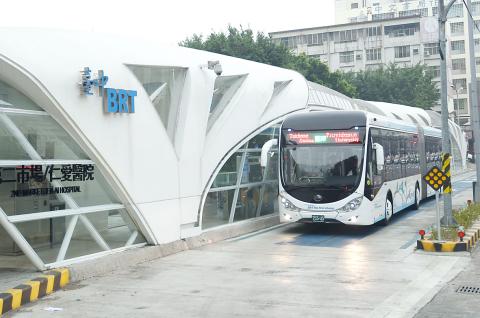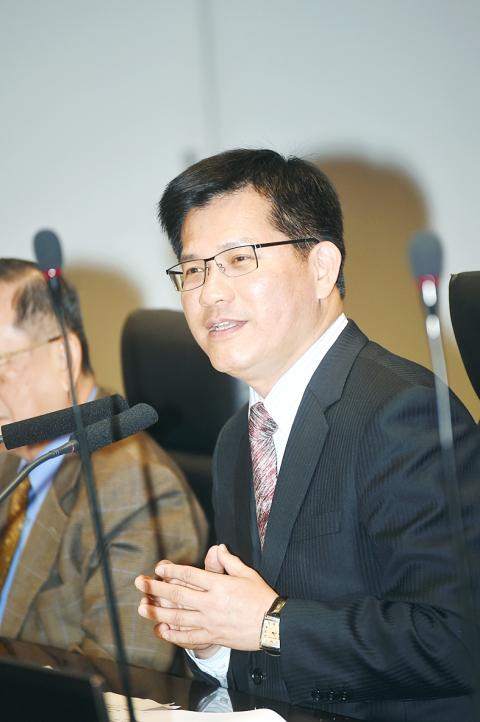The problem-plagued Bus Rapid Transit (BRT) system in Taichung, launched in July last year, is to be abolished after Taichung Mayor Lin Chia-lung (林佳龍) yesterday announced that the BRT lanes would be replaced with “optimized, dedicated bus lanes” starting on July 8.
Lin made the announcement at a city administration meeting.
He declined to describe the move as the “abortion” of the system, instead calling the city’s existing system “stillborn,” as BRT buses do not possess exclusive road rights or priority traffic signals, and the BRT traffic control center cannot communicate directly with the buses while they are on the road or at its stations.

Photo: Liao Yao-tung, Taipei Times
Under the new policy, existing BRT lanes would be exclusively for public buses that currently run on the dedicated bus-only lanes on Taiwan Boulevard (台灣大道) — the main road through the heart of the city — while BRT double-carriage buses would continue to run on the lanes after concerns over safety are addressed, the Taichung Transportation Bureau said.
About 30 percent of the public buses on Taiwan Boulevard would then be allowed to travel on the dedicated bus-only lanes, leaving slower lanes for motorists and motorcyclists, while at lease two bus lines on Taiwan Boulevard would continue to operate on the slow lanes for passengers using minor stations, the bureau said.
All the buses running on the “optimized dedicated bus lanes” would have a uniform look so that they can be easily identified, Lin said.

Photo: Liao Yao-tung, Taipei Times
“Their new livery will become Taichung’s new mobile landmark,” he added.
Lin said that decision would save the city government NT$28 billion (US$893.1 million) previously allocated for the completion of existing BRT lanes — and an additional five BRT lanes — adding that the money would be used to improve the city’s traffic management.
The city government contracted a team of experts to examine and review the BRT system after Lin took office in December last year.
The report was concluded on Saturday.
Lin said that the “optimized dedicated bus lanes” program integrates two proposals — “BRT Plus Bus” and “Pure Bus” — among the four suggested by the team.
The other two suggestions — “Pure BRT” and “BRT Plus Bus plus priority traffic signals” — were not accepted, after an evaluation found the difficulties in implementation were insuperable, Lin said.
The BRT system was the subject of heated debate among Taichung candidates in the nine-in-one elections in November last year.
When the system was launched by then-mayor Jason Hu (胡志強) of the Chinese Nationalist Party (KMT), Lin, a member of the Democratic Progressive Party, criticized Hu for rushing it through in a bid to garner votes in his re-election effort.
Lin said yesterday that the system was a failure in its establishment and operation.
Some motorists have complained about traffic congestion and what they describe as difficulty changing lanes, since BRT stations and lines were built on the islands between slow and express lanes.
A motorist surnamed Liu (劉) expressed disapproval of the new program, saying it would not make it any easier to change lanes and could increase the likelihood of an accident with more public buses running on the lanes.
Having the BRT lanes accommodate so many buses would only slow traffic, an unidentified KMT Taichung city councilor reportedly said, adding that Lin opposed the BRT just because it was a project of Hu’s.
The Ministry of Transportation and Communications later yesterday said that it would not ask the Taichung City Government to return the NT$163 million appropriated by the city to subsidize the construction of the BRT system.
The budget was given to the city to build the bus system and for the operator to purchase buses, ministry official Hu Ti-chi (胡迪琦) said, adding that, as the city plans to continue using the facilities despite the decision it made regarding the BRT lanes yesterday, the ministry would not ask the city to return the money.

Chinese Nationalist Party (KMT) Chairman Eric Chu (朱立倫), spokeswoman Yang Chih-yu (楊智伃) and Legislator Hsieh Lung-chieh (謝龍介) would be summoned by police for questioning for leading an illegal assembly on Thursday evening last week, Minister of the Interior Liu Shyh-fang (劉世芳) said today. The three KMT officials led an assembly outside the Taipei City Prosecutors’ Office, a restricted area where public assembly is not allowed, protesting the questioning of several KMT staff and searches of KMT headquarters and offices in a recall petition forgery case. Chu, Yang and Hsieh are all suspected of contravening the Assembly and Parade Act (集會遊行法) by holding

PRAISE: Japanese visitor Takashi Kubota said the Taiwanese temple architecture images showcased in the AI Art Gallery were the most impressive displays he saw Taiwan does not have an official pavilion at the World Expo in Osaka, Japan, because of its diplomatic predicament, but the government-backed Tech World pavilion is drawing interest with its unique recreations of works by Taiwanese artists. The pavilion features an artificial intelligence (AI)-based art gallery showcasing works of famous Taiwanese artists from the Japanese colonial period using innovative technologies. Among its main simulated displays are Eastern gouache paintings by Chen Chin (陳進), Lin Yu-shan (林玉山) and Kuo Hsueh-hu (郭雪湖), who were the three young Taiwanese painters selected for the East Asian Painting exhibition in 1927. Gouache is a water-based

Taiwan would welcome the return of Honduras as a diplomatic ally if its next president decides to make such a move, Minister of Foreign Affairs Lin Chia-lung (林佳龍) said yesterday. “Of course, we would welcome Honduras if they want to restore diplomatic ties with Taiwan after their elections,” Lin said at a meeting of the legislature’s Foreign Affairs and National Defense Committee, when asked to comment on statements made by two of the three Honduran presidential candidates during the presidential campaign in the Central American country. Taiwan is paying close attention to the region as a whole in the wake of a

OFF-TARGET: More than 30,000 participants were expected to take part in the Games next month, but only 6,550 foreign and 19,400 Taiwanese athletes have registered Taipei city councilors yesterday blasted the organizers of next month’s World Masters Games over sudden timetable and venue changes, which they said have caused thousands of participants to back out of the international sporting event, among other organizational issues. They also cited visa delays and political interference by China as reasons many foreign athletes are requesting refunds for the event, to be held from May 17 to 30. Jointly organized by the Taipei and New Taipei City governments, the games have been rocked by numerous controversies since preparations began in 2020. Taipei City Councilor Lin Yen-feng (林延鳳) said yesterday that new measures by